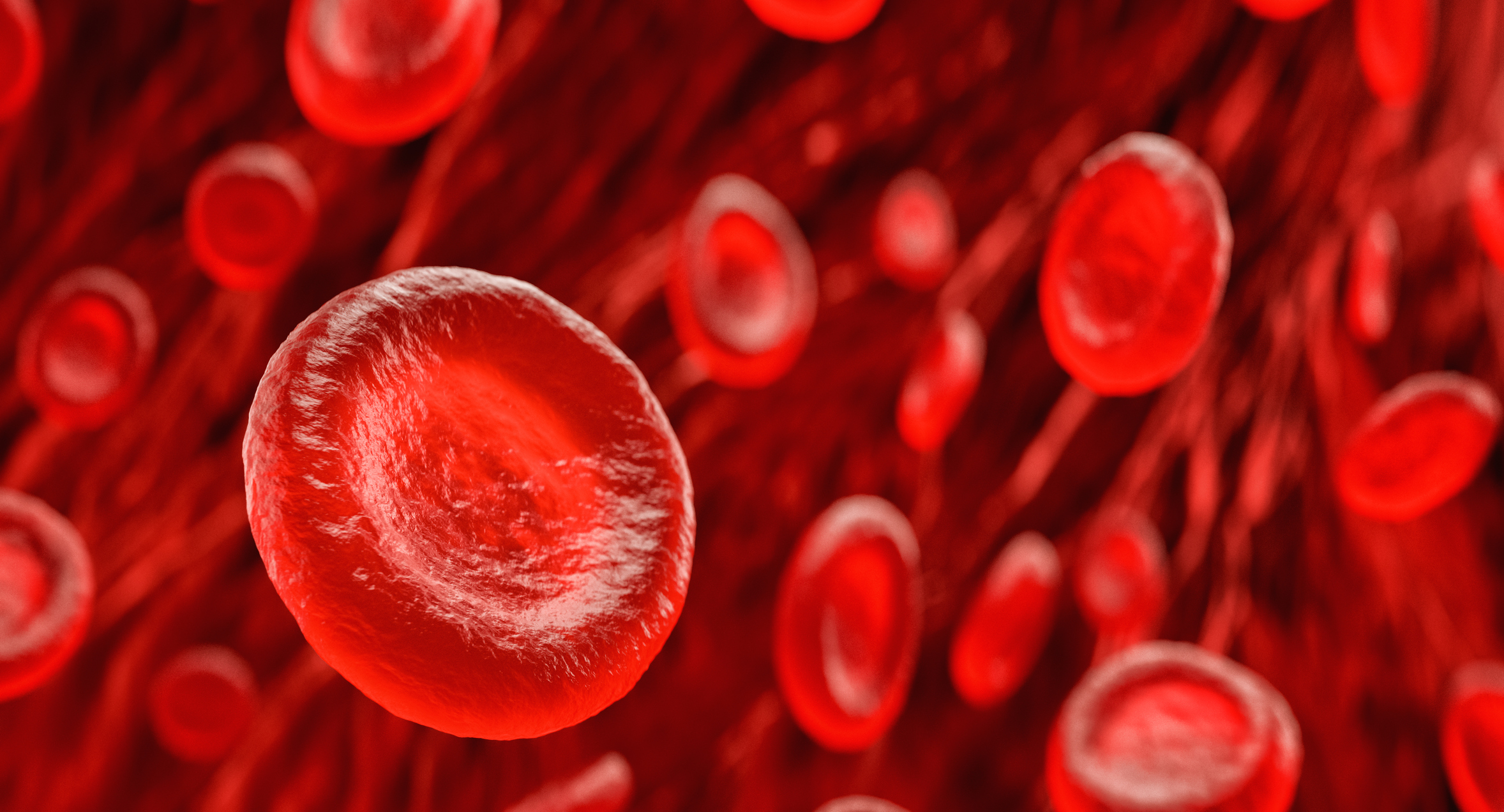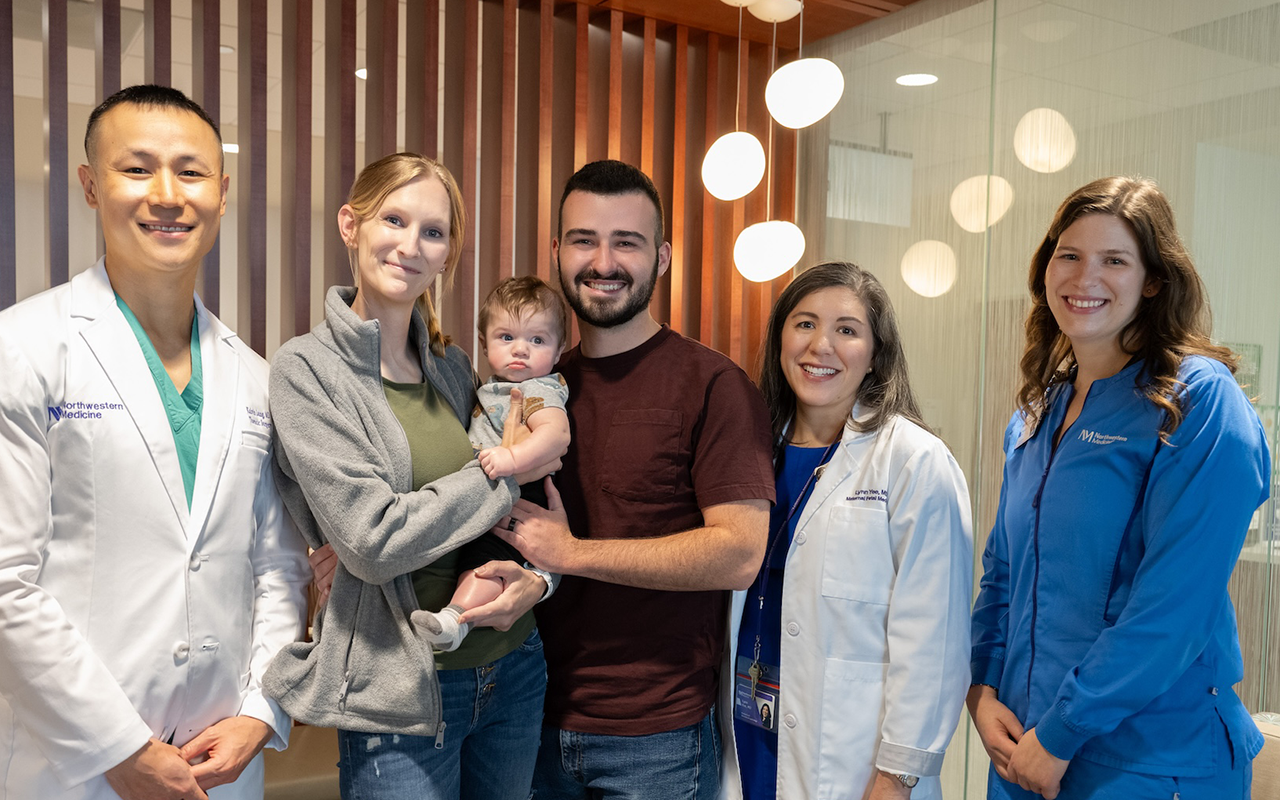Big Discoveries of 2020
COVID-19 had a dramatic impact on Feinberg’s research enterprise in 2020. Projects deemed essential required some investigators to socially distance in laboratories and facilities, while others worked from home to analyze data, devise new experiments, and conduct virtual meetings. Many investigators transitioned their ongoing research to COVID-19, others had to rethink the execution of their clinical trials in order to abide by social distancing guidelines. Despite these incredible challenges and obstacles, Feinberg kept moving onward and upward. Here is a look back at a handful of groundbreaking research stories that marked an unprecedented and transformative year.
Saving COVID-19 Patients’ Lives with Double Lung Transplants

Early this summer, for the first time, surgeons at Northwestern Medicine performed a double-lung transplant on a patient whose lungs were damaged by COVID-19. Since then, they have performed several such surgeries, and according to a Northwestern Medicine study published in Science Translational Medicine, double lung transplantation may be a life-saving treatment for patients with COVID-19-associated fibrotic lung damage. Using new imaging techniques to analyze the damaged lung tissue, surgeons found that COVID-19 can produce irreversible damage in some patients — for which a double lung transplant may be the only option for survival.
“Matrix imaging shows, for the first time, that COVID-19 destroys the basic framework of the lung — that’s what makes it unrecoverable in some patients,” said Ankit Bharat, MBBS, the Harold L. and Margaret N. Method Research Professor of Surgery, chief of Thoracic Surgery, and lead author of the study.
Unraveling the Epigenome of Zebrafish

Northwestern Medicine investigators identified tissue-specific epigenetic regulators in zebrafish, filling in a longtime gap in the understanding of the organism’s genome. According to Feng Yue, PhD, the Duane and Susan Burnham Professor of Molecular Medicine and senior author of the study published in Nature, the findings could help scientists use the model organism to unravel human diseases such as cancer, since more than 70 percent of protein-coding genes in the zebrafish genome are also present in humans. “If you see something in the human genome and can’t establish a cause, you can use this data to perform experiments in zebrafish. This will be very valuable for researchers in this field,” said Yue, who is also the director of the Center for Advanced Molecular Analysis at the Institute for Artificial Intelligence in Medicine.
Finding a New Drug Target for COVID-19

When the novel SARS-CoV-2 virus began to rear its spikey crown, Northwestern Medicine investigators were charged with helping to widen the scope of research. Led by Karla Satchell, PhD, professor of Microbiology-Immunology and director of the Center for Structural Genomics of Infectious Diseases, a team of scientists identified a potential drug target in SARS-CoV-2: two critical proteins in a complex called nsp10/16. According to the investigators, a drug that can inhibit nsp10/16 would allow the immune system to detect the virus and eradicate it faster. “This is a really beautiful target, because it’s a protein absolutely essential for the virus to replicate,” Satchell said. The investigators also mapped the atomic structure of nsp10/16, which was published for public use on the RSCB Protein Data Bank.
Improving Breast Cancer Detection Through AI

An international team of investigators, including those from Northwestern Medicine, developed a new artificial intelligence (AI) model that predicted breast cancer in mammograms more accurately than radiologists, reducing false positives and false negatives. The study, published in Nature, was co-authored by Mozziyar Etemadi, MD, PhD, research assistant professor of Anesthesiology and of Biomedical Engineering at the McCormick School of Engineering. “Breast cancer is one of the highest causes of cancer mortality in women,” Etemadi said. “Finding cancer earlier means it can be smaller and easier to treat. We hope this will ultimately save a lot of lives.”
Uncovering the Cellular Mechanisms Behind Genetic Mutations in ALS

A team of Northwestern Medicine scientists led by Evangelos Kiskinis, PhD, assistant professor in the Ken and Ruth Davee Department of Neurology, discovered that mutations in the largest genetic contributor to ALS leads to the dysfunction and eventual degeneration of motor neurons in the brain. Published in Neuron, the findings shed light on the mechanisms and consequences of a defect in a gene called C9orf72, which disrupts the localization of proteins involved in RNA and protein metabolism. The study may also aid the development of novel therapeutic interventions for patients with the neurodegenerative disease, which currently has no cure.
Offering New Hope for Autism Diagnosis

A team of investigators from Northwestern Medicine, Ben Gurion University, Harvard University, and the Massachusetts Institute of Technology developed a novel precision medicine technique that uses AI to identify a subtype of autism by overlaying an array of biomedical and healthcare data. The technique, detailed in a study published in Nature Medicine, successfully identified, through elaborate data analysis, dyslipidemia-associated autism, which represents 6.55 percent of all diagnosed autism spectrum disorders in the United States. “Today, autism is diagnosed based only on symptoms, and the reality is that when a physician identifies it, it’s often that early and critical brain developmental windows have passed without appropriate intervention. This discovery could shift that paradigm,” said Yuan Luo, PhD, associate professor of Preventive Medicine in the Division of Health and Biomedical Informatics and co-first author of the study.
Utilizing B-Cells to Promote Glioblastoma Immunity

Northwestern investigators developed a novel vaccine that utilizes a specialized group of B-cells to promote anti-tumor immunity against glioblastoma, with the findings published in the Journal of Experimental Medicine. The vaccine, which is still in pre-clinical stages, is the first of its kind and may be an alternative to currently available immunotherapeutic approaches to treat the fatal brain cancer. Catalina Lee Chang, PhD, research assistant professor of Neurological Surgery, was the first author of the study and Maciej Lesniak, MD, chair and the Michael J. Marchese Professor of Neurological Surgery, was the senior author. “With this vaccine, we are targeting the dual functionality of B-cells to tackle tumor immunosurveillance escape,” Lee Chang said. “We aim to utilize both the cellular and humoral immunity of B-cells.”
Groundbreaking Prostate Cancer Treatment

In a first-of-its-kind clinical trial, advanced prostate cancer was treated based on its genomic makeup, and delayed progression for patients with metastatic castration-resistant prostate cancer, a deadly and treatment-resistant form of the disease. Patients randomly selected to receive the drug olaparib experienced delayed disease progression for seven months on average compared to just three months for the standard treatment cohort. Additionally, about 60 percent of men in the olaparib group showed no disease progression at six months compared to 23 percent in the standard cohort.
The clinical trial, published in the New England Journal of Medicine and led by Maha Hussain, MBChB, the Genevieve E. Teuton Professor of Medicine in the Division of Hematology and Oncology, represents a breakthrough in treating this deadly cancer and for precision medicine more broadly.










